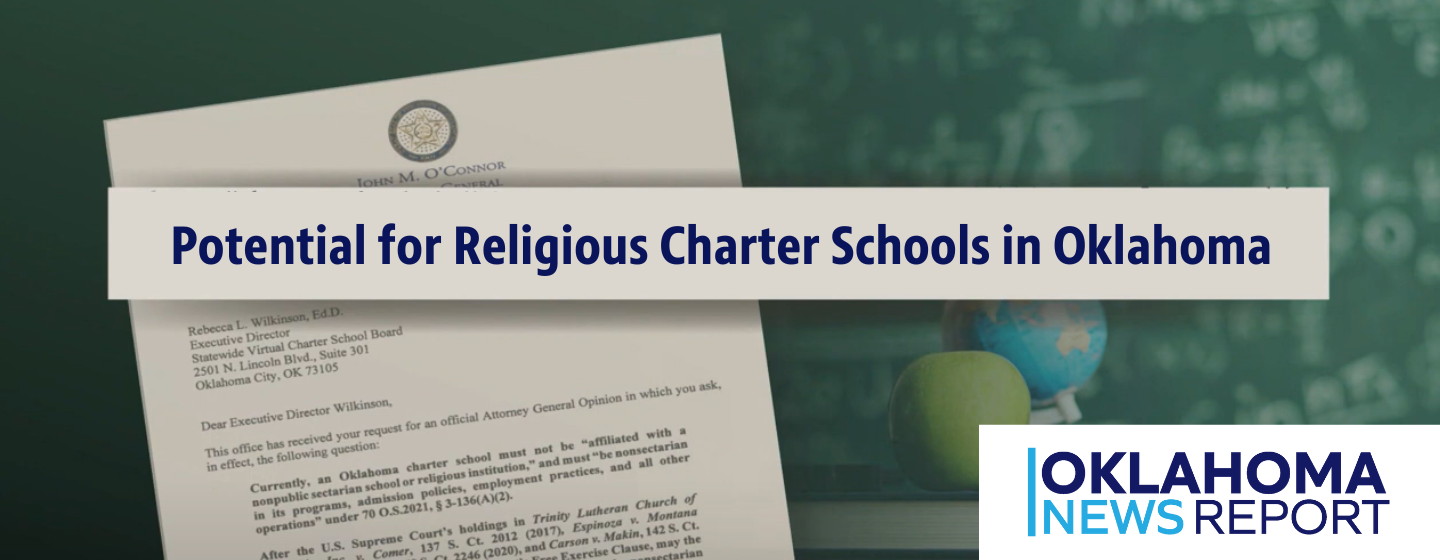A series of recent rulings by the US Supreme Court has prompted a written opinion from our state's outgoing Attorney General that could lead to religious charter schools opening here in Oklahoma.
In November 2021 Catholic Archbishop Paul Coakley sent a letter to the Oklahoma statewide Virtual Charter School board asking if a potential request to sponsor and create a charter school would be granted or denied.
“We've been establishing schools for 2,000 years along with hospitals and other institutions. It's just part of our responsibility to the civic sphere.”, said Brett Farley, executive director of the Catholic Conference of Oklahoma. He also stated that the Catholic church wants to provide a more affordable option for students. “That's been the big challenge when we're talking particularly about underprivileged kids in the metro area that just have no other option besides the public option. Parents need to have more opportunities to send their kids where they're going to perform best, where they're going to have the best opportunity to succeed. The big problem has been funding. That's why we've been moving for expanding school choice options.”
After receiving the letter from Archbishop Coakley, Rebecca Wilkinson, executive director of the Statewide Virtual Charter School Board requested an official opinion from Outgoing Attorney General John O'Connor. Wilkinson asked if the board should continue to enforce Oklahoma's current statute that states:
"A charter school shall be non-sectarian in its programs, admission policies, employment practices, and all other operations. A sponsor may not authorize a charter school or program that is affiliated with a non-public sectarian school or religious institution."
The official legal opinion by John O'Connor disagreed and read in part:
“In sum we do not believe the US Supreme Court would accept the argument that because charter schools are considered public for various purposes, that a state should be allowed to discriminate against religiously affiliated private participants who wish to establish and operate charter schools in accordance with their faith alongside other private participants.”
O'Connor used recent Supreme Court rulings to justify his opinion. One of the cases was Trinity Lutheran Church of Columbia vs. Comer. Oklahoma City University Associate Professor of Law, Jeremy Telman says in this case, the state policy for school grants was in question.
“There were resources available so they could redo their playgrounds. Trinity Lutheran applied, and they would've gotten a grant, but they were excluded because they were religious. And the court said, that's not fair. You can't discriminate against religious schools. But note, that's to redo a playground. The notion there is that you can't discriminate against religious institutions when they're serving some non-sectarian function, right? There's a strong case to be made that Catholic kids should have safe playgrounds, just like secular kids.”
The other two cases cited by O'Connor were Espinoza vs Montana Department of Revenue and Carson vs Maine.
Telman continued, “In Espinoza it was about tax credits for scholarships. And in Carson the problem was that Maine has these rural counties with no public schools. And so the state said, we'll just give you money and you can send your kids to the private school of your choice, so long as it's not a religious school. And the court said again, you can't discriminate against religious schools.”
“If the Supreme Court says they can't be excluded from those programs. We think also that they cannot be excluded from a charter program, and that's ultimately what the Attorney General's office said.”, says Brett Farley.
Official opinions issued by the Attorney General are usually treated as legally binding unless a court declares otherwise.
Farley says the Catholic Church plans to continue with the application process. “That application is due in January. When we submit that the board has 90 days to review it and can consider it on its merits. Depending on what they say, then we move on from there. If they approve, of course, then we'll move forward with the actual process of establishing a Catholic Charter School.”
At least one legislator feels that this could violate the separation of church and state. Representative Mickey Dollens (D) of Oklahoma City says, “It's a blatant violation of the Blaine Act, which was implemented in 1906 in the Oklahoma State Constitution to prevent state funds from going to Catholic schools. Since then, the Blaine Amendment has been used to keep the 10 Commandments off the capitol grounds. The question that I asked the AG is, would he open this up for other religious institutions? I know that the temple of Satan is recognized by the IRS as an actual religion; would he be open for them to take taxpayer dollars and open up a charter school and use state funded dollars?”
Representative Dollens is concerned about how the state will go about awarding charter schools to religious organizations while maintaining proper oversight. “This has already been addressed twice in our state's history and why the AG didn't consider that when writing his opinion and instead used some obscure higher court rulings from Maine and a couple of other states that he took out of context and thought he could apply to Oklahoma is just absurd to me.”
We also reached out to the incoming attorney General Gentner Drummond to get his view on the matter but did not receive a response. Drummond could overturn O'Connor's opinion if asked by elected state officials to review it.





